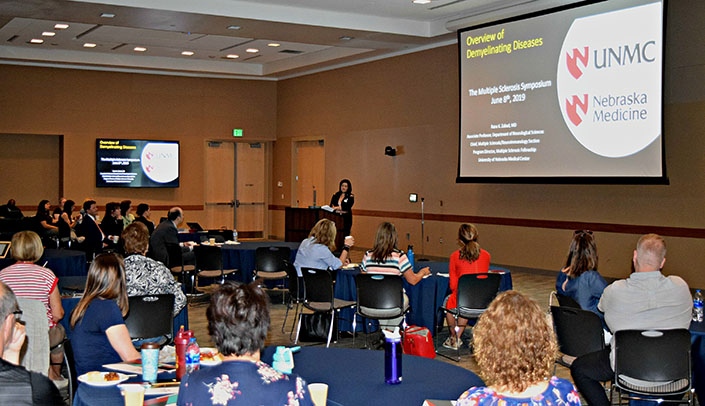Multiple sclerosis is a complex autoimmune neurological disease that has numerous mimickers. A misdiagnosis and inaccurate treatment can be harmful to the patient.
That was one of the many important messages shared with 61 Nebraska physicians, nurses, physical and occupational therapists, pharmacists, students, and patients at UNMC’s first Multiple Sclerosis Symposium on June 8.
Rana Zabad, M.D., associate professor in the UNMC Department of Neurological Sciences and director of Nebraska Medicine’s Multiple Sclerosis Clinic, said the symposium content demonstrated the diagnostic complexities of the disease and included an overview of the many medications available for treatment.
“Therapy options have grown in the past 25 years and diagnostic criteria has evolved four times in the past 16 years. There’s a lot of new information and MS is easy to misdiagnose. New specific antibody tests associated with newly defined demyelinating diseases can distinguish some mimicking disease from multiple sclerosis,” she said.
“The problem is, if you treat a disease that’s not MS with MS medications, you can harm the patient. A blood test makes the difference. I want physicians to think about these different diseases first — then order the extra test.”
The complexity of the disease, its symptoms, and treatment demands a multidisciplinary team approach that involves neurology, immunology, imaging, nurse navigators, rehabilitation and social services amongst others.
The Multiple Sclerosis Clinic began 20 years ago with about 300 patients. Since Dr. Zabad arrived in 2008, the clinic has grown to serve more than 3,000 patients, primarily from Nebraska and Iowa, but also from Missouri, Kansas, North Dakota and South Dakota. It is designated as Center for Comprehensive MS Care by the National Multiple Sclerosis Society and Consortium of MS Centers, the only one in the state of Nebraska.
“We use telemedicine and tele-education services to serve patients in rural Nebraska with plans for ongoing expansion,” Dr. Zabad said.
Services and resident positions are expanding as two new faculty members join the team this month. In addition, a donor has provided support for a fellowship training program in the department. “We’re looking for a physician or an advanced practice provider we can train and keep in Nebraska,” Dr. Zabad said.
